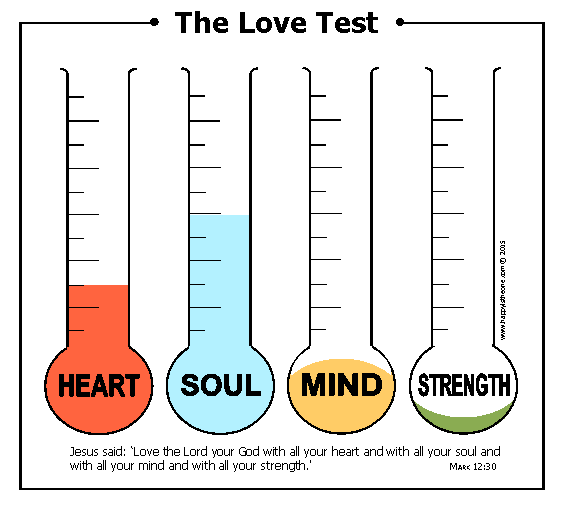I don’t know about you, but a lot of what I hear and read in relation to love of God is about how much God loves me. I can’t recall hearing a sermon or reading in a book about the command for me to love God. Certainly I’ve never read a lot of clues as to how to go about loving God with all my heart, soul, mind and strength (Mark 20:30). Yet, according to Jesus, it is the first and greatest commandment.
Jesus provides us with some interesting insights into the problem. We’re to love God more than our families (Luke 14:26), and more than our lives, as Jesus does (Luke 8:21; John 14:31). Jesus also teaches us that a practical demonstration of love for Him and, through Him, for the Father is to keep His commandments (John 14:15, 21, 23-24) and to heal the sick, feed those who hunger and thirst, and visit those in prison (Matthew 25:40). In fact, most sermons I’ve heard deal with the commandment to love God by exhorting the congregation to focus on the second great commandment: to love one’s neighbour as oneself (Matthew 22:39).
Can we measure our love for God solely by our love for our neighbour, as expressed in good works? Somehow that just doesn’t seem to capture the passion behind the command to love God with all one’s heart, all one’s soul, all one’s strength and all one’s mind. We know what ‘all’ looks like because Jesus demonstrates it. To me, an attempt to match the ‘all’ of Jesus is rather like planning to ascend Mount Everest without an oxygen tank and no friendly Nepalese guide: it’s beyond imagining.
As I pondered the question of loving God more, what I was able to imagine was a little test for myself. The results are below.
As you can see, I wasn’t too hard on myself. But forget the level in each gauge: it is the relativities that tell the real story.
I’m more optimistic about the way my soul loves God because I am absolutely certain God has planted a seed of desire for God within me. What’s more, I know God grows that seed without any help from me (Mark 4:26-28), even though I may inhibit the full potential for growth. And often I do actually feel love for God – warm, sweet, joyous love – so I know my heart is engaged, even though most of the time my actions declare I love myself more.
Taking the temperature of mind and strength I found to be very encouraging. But they are so weak, I hear you say. Yes, they’re incredibly weak, but they’re areas where I can clearly see a way forward. Since reading Joyce Meyer’s Battlefield of the Mind, I am much better at noticing when my thoughts are running counter to God and resetting their direction. This is an area where plenty of practical strategies are freely available. And those strategies can be easily adapted and applied to the strength with which I apply myself to building a relationship with God. For example, putting God first by putting a higher priority on prayer and bible study each morning. There’s a long way to go, but the start of the journey gives cause for hope.
I invite you to take the ‘Love Test’. Just as we get regular blood pressure and other health checks, we can test our spiritual health, too. I have prepared a template that you can print off and fill in. Feel free to pass it on.
Jesus provides us with some interesting insights into the problem. We’re to love God more than our families (Luke 14:26), and more than our lives, as Jesus does (Luke 8:21; John 14:31). Jesus also teaches us that a practical demonstration of love for Him and, through Him, for the Father is to keep His commandments (John 14:15, 21, 23-24) and to heal the sick, feed those who hunger and thirst, and visit those in prison (Matthew 25:40). In fact, most sermons I’ve heard deal with the commandment to love God by exhorting the congregation to focus on the second great commandment: to love one’s neighbour as oneself (Matthew 22:39).
Can we measure our love for God solely by our love for our neighbour, as expressed in good works? Somehow that just doesn’t seem to capture the passion behind the command to love God with all one’s heart, all one’s soul, all one’s strength and all one’s mind. We know what ‘all’ looks like because Jesus demonstrates it. To me, an attempt to match the ‘all’ of Jesus is rather like planning to ascend Mount Everest without an oxygen tank and no friendly Nepalese guide: it’s beyond imagining.
As I pondered the question of loving God more, what I was able to imagine was a little test for myself. The results are below.
As you can see, I wasn’t too hard on myself. But forget the level in each gauge: it is the relativities that tell the real story.
I’m more optimistic about the way my soul loves God because I am absolutely certain God has planted a seed of desire for God within me. What’s more, I know God grows that seed without any help from me (Mark 4:26-28), even though I may inhibit the full potential for growth. And often I do actually feel love for God – warm, sweet, joyous love – so I know my heart is engaged, even though most of the time my actions declare I love myself more.
Taking the temperature of mind and strength I found to be very encouraging. But they are so weak, I hear you say. Yes, they’re incredibly weak, but they’re areas where I can clearly see a way forward. Since reading Joyce Meyer’s Battlefield of the Mind, I am much better at noticing when my thoughts are running counter to God and resetting their direction. This is an area where plenty of practical strategies are freely available. And those strategies can be easily adapted and applied to the strength with which I apply myself to building a relationship with God. For example, putting God first by putting a higher priority on prayer and bible study each morning. There’s a long way to go, but the start of the journey gives cause for hope.
I invite you to take the ‘Love Test’. Just as we get regular blood pressure and other health checks, we can test our spiritual health, too. I have prepared a template that you can print off and fill in. Feel free to pass it on.


 RSS Feed
RSS Feed